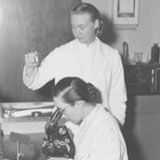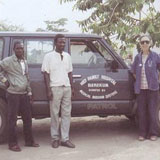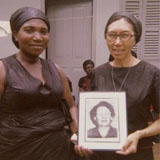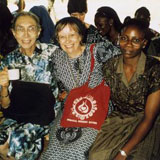Biography: Dr. Fernande Marie Pelletier

Sister Fernande Pelletier serves the goals of the Medical Mission Sisters, making good health care accessible to poor patients in remote areas.
Sister Fernande Pelletier, M.D., a member of the Medical Mission Sisters (founded 1925) has worked overseas for more than forty years, carrying out the mission of her order in Ghana and offering medical care to underserved populations. Her incredible devotion and service has been rewarded by the Ghanaian government, and in rural communities far from fully-equipped hospitals, she continues to care for those in need.
Fernande Pelletier was born in Fort Kent, Maine, in 1931. When she was 30 years old she became a Medical Mission Sister. She graduated from Georgetown University Medical School in Washington, D.C., in 1959, and left home for her life overseas shortly after completing her surgical residency. In 1961 she began four decades of service in Berekum, Brong Ahafo, Ghana. Her first post was at the Holy Family Hospital in Berekum. Six years later, she was transferred to a district medical hospital in Kiri, Zaire, and in 1970 she returned to Berekum, where she still works today.
In the half-century that Medical Mission Sisters have worked in Ghana, the nation's infrastructure has changed enormously. Roads, hospitals and medical education have altered the landscape and Ghanaians' access to health care. Since the Medical Mission Sisters first offered medical care to Indian Muslim women who were prevented from visiting male physicians, their worldwide efforts have often meant overcoming not only cultural conventions but also practical and technological limitations. Dr. Pelletier believes that her sound medical training at Georgetown has been invaluable in treating patients in this context of limited resources.
Sister Pelletier has learned Twi, the local dialect, to be able to talk directly to her patients as well as the midwives and nurses she has trained over the years. By immersing herself in the local culture, she is able to understand the different ways her patients think of their illnesses, and to work within these belief systems to help them. For example, many people she treats relate their medical problems to past behavior, believing they are being punished for previous thoughts and actions. Rather than trying to persuade such patients to abandon their beliefs to embrace Christianity and the tenets of the medicine she practices, she concentrates on relieving their suffering. As she explains ,"[b]y our action we express our religious belief. Not 'I heal you and now you join my religion'...but by action, by healing people out of love, and making them whole. That, I think, speaks louder."
Sister Pelletier's efforts to integrate herself into the local culture have been well received by the community she serves. In 1976, townspeople of many different religions—including Islamic, animist and traditional African beliefs—mourned the death of her mother by wearing black clothing, and nominated Christiana Baanie Yeboah, a local woman, to become a maternal guardian for her.
Such communication and friendship helps Sister Fernande contribute to the health of the people of Berekum. In addition to giving primary care, she offers AIDS education, home visits to new mothers, training for medical health personnel, and provides supplies and assistance from her base at Holy Family Hospital. By way of her travels in the hospital's outreach vehicle, she distributes medicines and offers health care to those living in areas without hospitals or resident doctors.
Sister Pelletier's dedication has been celebrated by the Ghanaian government, who awarded her their Grand Medal for her outstanding rural medical services to the Ghanaian people. The Ghana Medical Association rewarded her dedicated service to the nation with a Fellowship Award, in 1996.
Nearly half a century since her first assignment, Sister Fernande Pelletier continues to serve the goals of the Medical Mission Sisters, making good health care accessible to poor patients in remote areas. She represents an integral part of their global project and commitment to providing good health care a low cost and promoting the equitable distribution of world resources for the benefit of all.
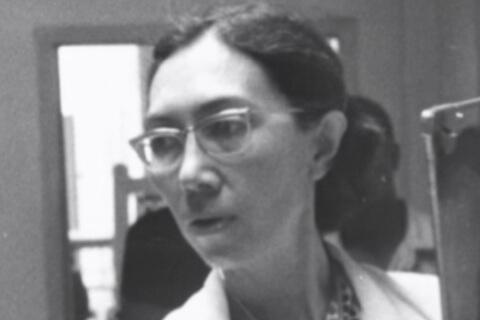
Dr. Fernande Marie Pelletier
Dr. Fernande Marie Pelletier
Dr. Fernande Pelletier went to Africa in 1961 as a Medical Mission Sister. A graduate of the Georgetown University Medical School, she was thirty years old when she left home to begin her service. Her destination was the city of Berekum, Ghana, where she has now lived and served for over forty years. Throughout her service, Dr. Pelletier has had to overcome language, technological, and cultural barriers. She learned the local dialect, Twi, so she could talk directly with her patients, and the midwives and nurses she has trained over the years. She immerses herself in the local culture, trying to understand the ways that her patients think about their illnesses. Her dedication to her work has been celebrated by the Ghanian Government, who awarded Dr. Pelletier the Grand Medal for outstanding rural medical work. In addition to medical supplies, Dr. Fernande Pelletier provides AIDS education, home visits to new mothers, and training for new medical health workers. Using the Holy Family Hospital Outreach Vehicle for travel, she reaches remote areas without hospitals and doctors, caring for her patients' needs in any way she can. Dr. Pelletier respects the spiritual beliefs of her patients and concentrates on relieving their illnesses or injuries. She explains, 'By our action, we express our religious belief. Not 'I heal you and now you join my religion'... But by action; by healing people out of love and making them whole. That, I think, speaks louder.' Dr. Pelletier continues to serve the goals of the Medical Mission Sisters, making good health care accessible to poor patients in remote areas.




